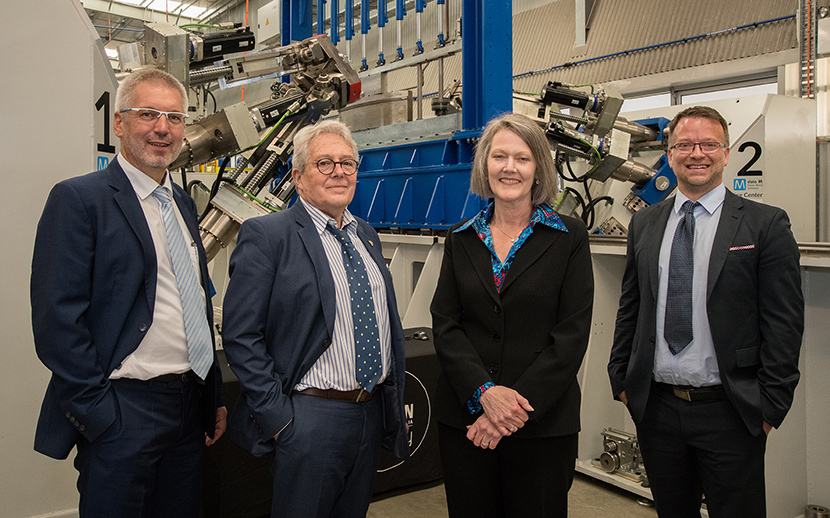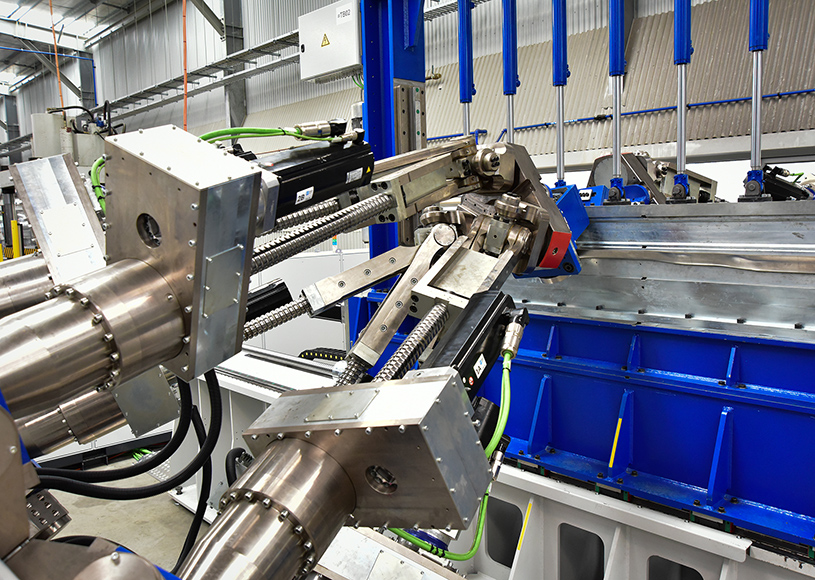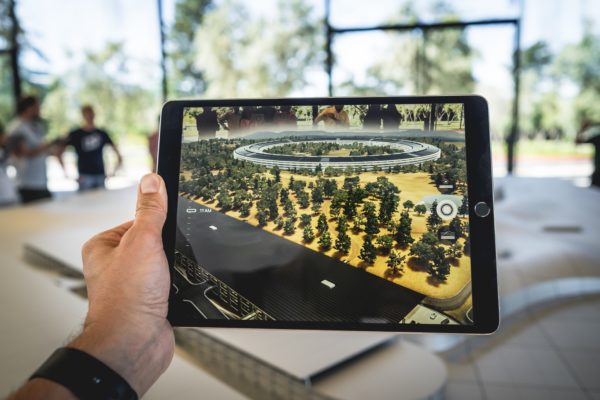A breakthrough process developed by Deakin University researchers is set to reduce the cost of manufacturing super-strength products for automotive, truck, rail and aerospace industries.
A first-of-its-kind $1.5 million facility dedicated to advanced metal development and 3D roll forming has been launched at Deakin’s Institute for Frontier Materials (IFM), supported by the Federal Government through the Australian Research Council (ARC).
The Deakin process allows lightweight, high strength metal strips to be bent into highly specific shapes at room temperature, superseding existing, expensive, heat-based processes.
Researchers at the facility are already working with engineers from Ford Motor Company and the Wuhan Iron and Steel Institute to develop prototype parts that will be super strong, such as bumper bars and crash components like longitudinal members, cross members and side rails.
“Deakin’s new 3D Roll Forming Facility provides a state-of-the-art manufacturing facility, enabling us to explore flexible manufacturing techniques in applications that were traditionally the sole domain of hot stamping and deep drawing/stretch forming,” said Richard Taube, Australia Manager, University Programs at Ford (Research and Advanced Engineering).
The IFM Flexible Forming Facility features a dynamic 3D roll forming process developed, patented and manufactured by German research partner data M Sheet Metal Solutions. It will support complex roll forming – a process involving incrementally bending long strips of sheet metal into highly specified shapes – and will be used for proof-of-concept studies on the flexible roll forming process, rapid prototyping and the manufacture of complex profiles from hard-to-form materials.
 From left to right: Albert Sedlmaier from data M Sheet Metal Solutions, Deputy Vice-Chancellor (Research) Professor Joe Graffam, ARC Chief Executive Officer Professor Sue Thomas and Senior Research Fellow Dr Matthias Weiss.
From left to right: Albert Sedlmaier from data M Sheet Metal Solutions, Deputy Vice-Chancellor (Research) Professor Joe Graffam, ARC Chief Executive Officer Professor Sue Thomas and Senior Research Fellow Dr Matthias Weiss.
ARC Chief Executive Officer Professor Sue Thomas joined Deakin Deputy Vice‐Chancellor Research Professor Joe Graffam to launch the Facility at the Waurn Ponds Campus.
“The Flexible Forming Facility presents an exciting new opportunity for industry collaboration and research at Deakin University,” Professor Graffam said.
“This will extend our critical mass of dedicated and high-calibre researchers breaking boundaries in next-generation manufacturing, strengthening our leadership in the international area in this important field.”
Roll forming of structural and crash components is now widely applied across the automotive industry, thanks to the creation of high-performance materials such as Ultra High Strength Steels, advanced aluminium alloys and metal laminates. These provide safer and lighter components that will contribute to cost savings through fuel efficiency.
“Quality research infrastructure is a critical component of Australia’s research and development system,” said Professor Thomas. “With this in mind, the ARC’s LIEF scheme is designed to enable researchers to participate in cooperative initiatives so that expensive infrastructure, equipment and facilities can be shared between higher education organisations and industry.”
Supporting over 120 researchers, the IFM is a world leader in metals, steels and alloy design and processing research. Senior Research Fellow, Dr Matthias Weiss has been involved in sheet metal forming research at IFM for the past 15 years, is currently Head of the University’s Roll Forming Research Group.
“The challenge with high strength, high performance steels is that they are less formable and harder to shape without heat, which is quite expensive,” Dr Weiss said.
“Now we can do this shaping at room temperature, which will achieve significant cost savings for companies. Roll stands are no longer fixed in place during the process, allowing for more part flexibility, faster fabrication, and greater potential cost savings, compared to conventional forming methods like metal stamping. We expect the process will be in use by manufacturers within five to ten years.”
The facility was supported by a $280,000 ARC Linkage Infrastructure, Equipment and Facilities (LIEF) scheme funding grant.
For more information, contact Dr Weiss.
Published by Deakin Research on 11 October 2018



